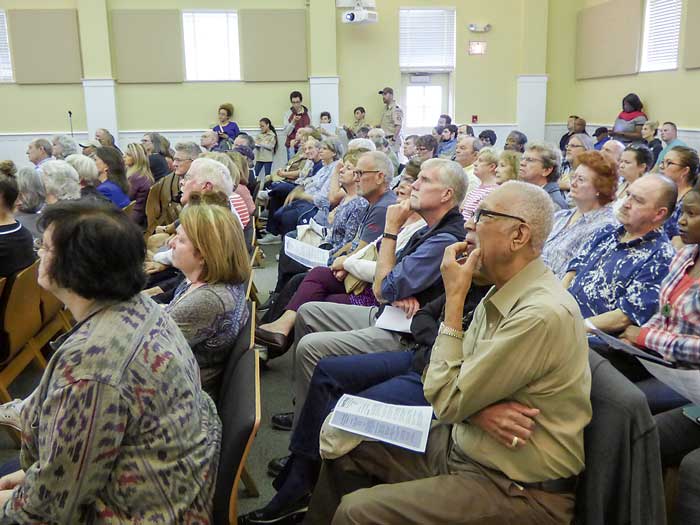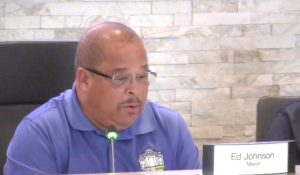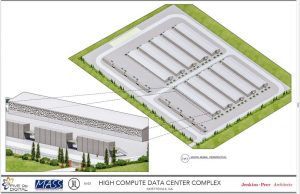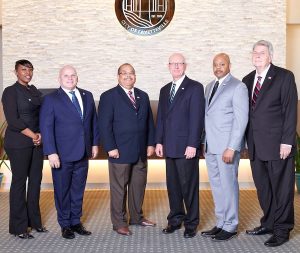Fayetteville Planning Commission delays vote until November meeting —
A rezoning request by Walton Communities to construct an apartment and retail development between the upcoming new City Hall greenspace property and a portion of Grady Avenue was tabled Oct. 23 by the Fayetteville Planning and Zoning Commission until November.
Walton Communities partner David Knight at the end of the presentation and comments requested that the item be tabled, saying, “Maybe we should put some more thought into this,” and suggesting Walton could work with city planning staff to address issues such as land use, buffers, environmental sustainability and traffic impact.
Commissioners agreed and tabled the agenda item.
As expected, there were more than two dozen area residents speaking against the proposed rezoning.
The request to rezone to C-1 (downtown historic mixed-use district) deals with approximately 29 acres, the former Sams property, adjacent to the south side of the recently acquired school board property that fronts Stonewall Avenue and extends south in the direction of Grady Avenue. Also included is a 1.47-acre property across Beauregard Avenue for commercial use. As proposed, the large tract would include 11 two- and three-story buildings that would accommodate 294 apartments, 17,700 sq. ft. of retail, six townhomes for rent and 28 townhomes for sale.
Pertaining to the expected rental prices, Knight said 1-bedroom apartments would likely bring $1,100, with 2-bedroom units at $1,500 and 3-bedroom units at $1,800.
Knight in his initial comments indicated that the townhomes for sale, located on the only portion of the property fronting Grady Avenue, could be replaced with single-family detached homes.
One of the speakers during public comments was former planning commissioner Alan Feldman, who cited concerns dealing with traffic congestion and gridlock.
Other speakers voiced objections based on the belief that crime rates would increase and home values would decrease, though the wealth of those opposed to the development cited a variety of traffic congestion and traffic flow concerns, and what they believed to be the lack of a need for additional apartments.
“Millennials don’t want to live here,” said area resident Matthew Davis, whose comments followed another resident who said the development would not attract people in the 19-35-year Millennial age group.
Others, despite the community preferences for such developments which were included in the comprehensive plan, spoke of the need for Fayetteville to continue to be a small town.

Another speaker, Bob Lester, lives across Grady Avenue from where the development would access that roadway.
Lester described the proposal as token mixed-use or “misuse.”
“The retail will be a laundromat or coffee shops,” Lester said, adding that the apartments could become Section 8 housing if they don’t rent.
It is noteworthy that similar community fears were expressed when the Meridian Apartments were approved. Open for less than two years, Meridian has already increased the rent, with 1-bedroom units bringing more than $1,000 per month.
Lester toward the end of his comments said, “Some on the board have conflicts of interest,” though he did not elaborate.
Asked after the meeting what he meant, Lester said Councilwoman Kathaleen Brewer owned two pieces of property and planning Chairman Sarah Murphy and Councilman Rick Hoffman own property on Lafayette Avenue (their home is situated between Lanier Avenue and Lafayette Avenue).
Lester was asked how owning property equated to a conflict of interest. At that point the person with Lester outside City Hall told Lester he did not need to respond. It was then that Lester began walking away.
It was explained to Lester by this reporter as he walked off that his comments about a conflict of interest were made in a public meeting and that a response from him was needed.
As they continued to walk away, the person with Lester said, “No comment,” with Lester saying nothing.
Asked about Lester’s comment on her property ownership, Brewer said a portion of her property backs up to the Walton Communities property. Brewer said she will not be voting on the rezoning request.
City planning staff recommended approval of the rezoning request because it is consistent with the Future Land Use Map and the goals of the 2017 Comprehensive Plan adopted by the City Council after the participation of more than 550 residents. Components of the plan called for the creation of a place of destination, and a vibrant, walkable downtown area.
Knight during his comments referenced Walton’s desire to create a suburban/urban walkable community. He said the development would include public streets that would connect to the upcoming City Hall and park space immediately to the north, which are expected to open in mid-2020.
Unlike developers who construct business and residential property and leave, Knight said Walton develops, owns and manages its properties.

Also speaking at the meeting, Walton Communities attorney Doug Dillard diplomatically noted that, given the recently adopted comprehensive plan and Future Land Use Map, the current zoning is inappropriate, unconstitutional and unlawful.
Walton Communities owns and manages 30 developments in Vinings, Atlanta, Roswell, Augusta, Alpharetta, Austell, Woodstock, Acworth and other cities.













Leave a Comment
You must be logged in to post a comment.